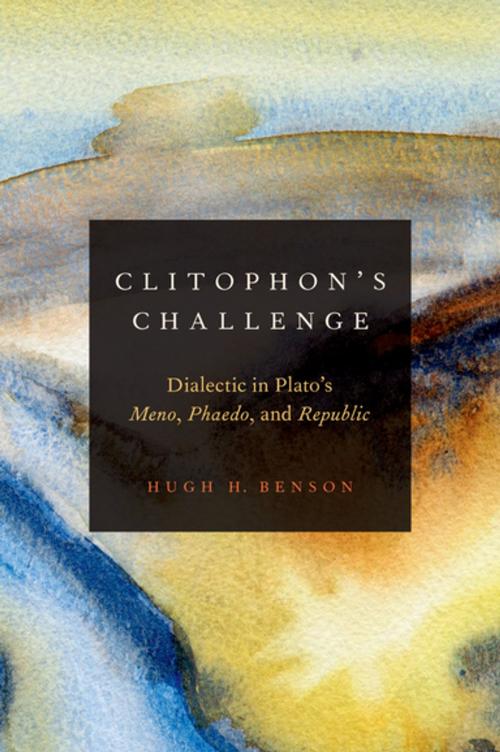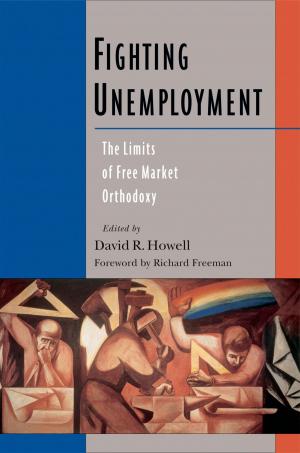Clitophon's Challenge
Dialectic in Plato's Meno, Phaedo, and Republic
Nonfiction, Religion & Spirituality, Philosophy, Ancient, History, Ancient History, Greece| Author: | Hugh H. Benson | ISBN: | 9780190273101 |
| Publisher: | Oxford University Press | Publication: | May 1, 2015 |
| Imprint: | Oxford University Press | Language: | English |
| Author: | Hugh H. Benson |
| ISBN: | 9780190273101 |
| Publisher: | Oxford University Press |
| Publication: | May 1, 2015 |
| Imprint: | Oxford University Press |
| Language: | English |
Hugh H. Benson explores Plato's answer to Clitophon's challenge, the question of how one can acquire the knowledge Socrates argues is essential to human flourishing-knowledge we all seem to lack. Plato suggests two methods by which this knowledge may be gained: the first is learning from those who already have the knowledge one seeks, and the second is discovering the knowledge one seeks on one's own. The book begins with a brief look at some of the Socratic dialogues where Plato appears to recommend the former approach while simultaneously indicating various difficulties in pursuing it. The remainder of the book focuses on Plato's recommendation in some of his most important and central dialogues-the Meno, Phaedo, and Republic-for carrying out the second approach: de novo inquiry. The book turns first to the famous paradox concerning the possibility of such an inquiry and explores Plato's apparent solution. Having defended the possibility of de novo inquiry as a response to Clitophon's challenge, Plato explains the method or procedure by which such inquiry is to be carried out. The book defends the controversial thesis that the method of hypothesis, as described and practiced in the Meno, Phaedo, and Republic, is, when practiced correctly, Plato's recommended method of acquiring on one's own the essential knowledge we lack. The method of hypothesis when practiced correctly is, then, Platonic dialectic, and this is Plato's response to Clitophon's challenge. "This is a new book on a critically important topic, methodology, as it is explored in three of the most important works by one of the most important philosophers in the very long history of philosophy, written by a scholar of international stature who is working from many years of experience and currently at the top of his game. It promises to be one of the most important books ever written on this subject."-Nicholas Smith, James F. Miller Professor of Humanities, Lewis and Clark College "The thesis is bold and the results are important for our understanding of some of the most studied and controversial dialogues by and philosophical theses in Plato. In my view, Hugh Benson's examination of the method of hypothesis in the Meno and the Phaedo is a tour de force of subtle and careful scholarship: I think that this part of the book will be adopted as the standard interpretation of this basic notion in Plato. An excellent and important book."-Charles Brittain, Susan Linn Sage Professor of Philosophy and Humane Letters, Cornell University
Hugh H. Benson explores Plato's answer to Clitophon's challenge, the question of how one can acquire the knowledge Socrates argues is essential to human flourishing-knowledge we all seem to lack. Plato suggests two methods by which this knowledge may be gained: the first is learning from those who already have the knowledge one seeks, and the second is discovering the knowledge one seeks on one's own. The book begins with a brief look at some of the Socratic dialogues where Plato appears to recommend the former approach while simultaneously indicating various difficulties in pursuing it. The remainder of the book focuses on Plato's recommendation in some of his most important and central dialogues-the Meno, Phaedo, and Republic-for carrying out the second approach: de novo inquiry. The book turns first to the famous paradox concerning the possibility of such an inquiry and explores Plato's apparent solution. Having defended the possibility of de novo inquiry as a response to Clitophon's challenge, Plato explains the method or procedure by which such inquiry is to be carried out. The book defends the controversial thesis that the method of hypothesis, as described and practiced in the Meno, Phaedo, and Republic, is, when practiced correctly, Plato's recommended method of acquiring on one's own the essential knowledge we lack. The method of hypothesis when practiced correctly is, then, Platonic dialectic, and this is Plato's response to Clitophon's challenge. "This is a new book on a critically important topic, methodology, as it is explored in three of the most important works by one of the most important philosophers in the very long history of philosophy, written by a scholar of international stature who is working from many years of experience and currently at the top of his game. It promises to be one of the most important books ever written on this subject."-Nicholas Smith, James F. Miller Professor of Humanities, Lewis and Clark College "The thesis is bold and the results are important for our understanding of some of the most studied and controversial dialogues by and philosophical theses in Plato. In my view, Hugh Benson's examination of the method of hypothesis in the Meno and the Phaedo is a tour de force of subtle and careful scholarship: I think that this part of the book will be adopted as the standard interpretation of this basic notion in Plato. An excellent and important book."-Charles Brittain, Susan Linn Sage Professor of Philosophy and Humane Letters, Cornell University















